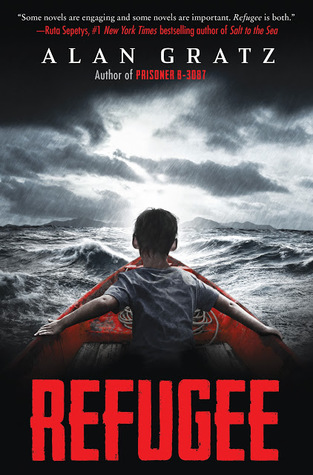 An important book and something of an introduction to readers of all ages who want to learn more about refugees.
An important book and something of an introduction to readers of all ages who want to learn more about refugees.
Mahmoud is a 12-year-old boy in Aleppo, Syria in 2015. His family is fleeing civil war and heads for Germany.
Josef is a 13-year-old boy in Berlin, Germany in 1938. His family is fleeing Nazi persecution and heads for Cuba.
Isabel is an 11-year-old girl in Havana, Cuba in 1994. Her family is fleeing starvation and civil rights abuses and heads for America.
Some people think trigger warnings are getting overused, but I can see how it might be helpful in a case like this. The book very quickly delves into matter-of-fact descriptions of the Nazi's inhumane treatment of Jews, the horror of having your home destroyed by a missile, and the hopelessness of living in fear of your own government and not having enough food. As you might expect in refugee stories, a number of difficult topics arise, for example, death, suicide, mental illness (PTSD), children taking on adult roles, and loss in many forms. I think the book's content might be better suited for middle schoolers, but if your upper elementary student wants to read it, at least be sure to discuss the book with them before, during, and/or after their reading.
I gave the book just shy of 5 stars because I wasn't sure what to make of it at first. In the beginning, there seemed to be a lot more "telling" rather than "showing", and everything felt melodramatic, like the book was written with the express purpose of manipulating your emotions. Of course, the subject matter is emotional, and the book eventually gave way to more natural storytelling, even if plenty of chapters ended in cliffhangers. Some reviewers seem to dislike the way the three stories are broken up and interspersed with each other, but I wonder if that strategy actually helps young readers to break up the intensity, so they can process each event individually and not get too overwhelmed by each main character's plight.
I was impressed by the wide range of ideas this book managed to incorporate. It provides an overall picture of how political conflicts can turn ordinary people into refugees, and how these tragedies happen all over the world and throughout human history. It's thought-provoking to consider how Germany was the place from which refugees fled in 1938, but then became the place that welcomed and assisted refugees in 2015; similarly, how Cuba was in a position to receive refugees in 1938, but then became a country of origin for refugees in 1994. We see incidences in which refugees take on an "each man for himself" mindset in order to ensure their own survival, and other scenarios when refugees support and assist each other as people sharing a common struggle. We see people in positions of power who separate themselves from the humanity of the situation by reminding themselves and others that they are "just doing their job." We encounter onlookers who turn their noses up at the "dirty refugees", locals who take advantage of the refugees' desperation to make their own money, and also people who go out of their way to provide water and food and assistance.
I found especially interesting the section at the end of the book that describes the historical facts related to each of the stories and explains how some characters were based on real people.


No comments:
Post a Comment